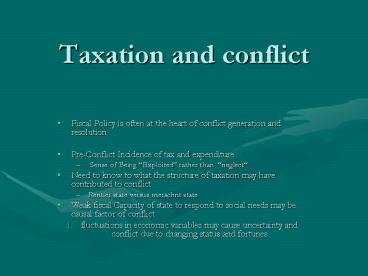Taxation and conflict - PowerPoint PPT Presentation
1 / 12
Title:
Taxation and conflict
Description:
Taxation and conflict Fiscal Policy is often at the heart of conflict generation and resolution Pre-Conflict Incidence of tax and expenditure Sense of Being ... – PowerPoint PPT presentation
Number of Views:92
Avg rating:3.0/5.0
Title: Taxation and conflict
1
Taxation and conflict
- Fiscal Policy is often at the heart of conflict
generation and resolution - Pre-Conflict Incidence of tax and expenditure
- Sense of Being Exploited rather than
neglect - Need to know to what the structure of taxation
may have contributed to conflict - Rentier state versus merachnt state
- Weak fiscal Capacity of state to respond to
social needs may be causal factor of conflict - fluctuations in economic variables may cause
uncertainty and conflict due to changing status
and fortunes
2
The Long-term view
- Focus on both side of the balance sheet
- problem of crowding out the state by donors
- Need to reconcile the long-term developmental and
short-run patronage-political approaches to
exigencies of peacemaking - Security , political
reform and building conflict management
capacities - Think of exit option - Both the urgency of needs
and weakness of the state can lead to high levels
of dependence that can become entrenched.
(Marshall Plan)
3
Armed conflict can effects the fiscal accounts
4
Negative side
- disrupting economic activities by crowding out
productive investment by state - eroding the tax base
- lowering the efficiency of tax administration
- and distorting the composition of public
spending.
5
Positive effect
- Willingness of citizen to pay tax (the Bellist
or Charles Tilly argument) - Greater Tax effort by state
- resource mobilization effect
- Ratchet effect
6
Neglect of Fiscus
- little awareness among policymakers of the links
between the states ability to manage public
resources and its ability to manage conflict. - Importance of fiscal pacts as part of
peace-building (South Africas sunset clauses
7
Importance of bringing Fiscal Policy on the
bargaining table
- Often the focus on Aid undercuts dialogue on
mobilisation and allocation of national resources - Problems of ability of the state to generate
consensus around the allocation of scarce public
resources.
8
Conditionality versus "Fiscal Pacts
- Temptation to use state weakness for imposing
policies - Overview of The World Banks, operations in El
Salvador, Bosnia, and Uganda, and an of
experiences in Cambodia, Eritrea, Haiti, Lebanon,
Rwanda, and Sri Lanka. concluded that if tax
effort and the pattern of public expenditures
have a direct bearing on post-conflict
reconstruction, as they did in El Salvador, it is
legitimate to include these parameters in the
conditionality agenda
9
Importance of Reconstruction and Growth
- Excessive focus on stabilisation
- IFI tendency to push the standard package of tax
reduction even in crisis periods - Assumption that good policies are always the
same, the new argument is that since
post-confect countries have poor policies, they
should be given more aid simply because of their
high
10
Taxation and Representation
- Higher citizens tax moral and representation
- Tax effort is often used as proxy for state
caacity because citizen willingness to pay
taxes is a measure of state legitimacy and a
basis for citizens demand accountability. - Importance of giving meaningful roles to organs
of representation
11
What taxes?
- It depends on structure of economy
- Broad based rather isolated rents have better
political economy consequences - Tax progressivity and equity along both vertical
and horizontal lines - Trade taxes for ease of collection and political
assertion of sovereignty - Tax aid bonanzas
12
Importance of social policy
- Build new social contract
- Budget allocation decisions need to consider
impact on horizontal inequalities, to avoid
factionalism and destabilizing winner-take-all
politics. - Reduce immediate suffering and vulnerability but
for both redistributive and productive arguments
(human capital) - To address some of the grievances that past
fiscal practices may have generated - Marshall Plan and the welfare state
- American pension scheme for the demobilised
- South Africas Sunset Clauses































